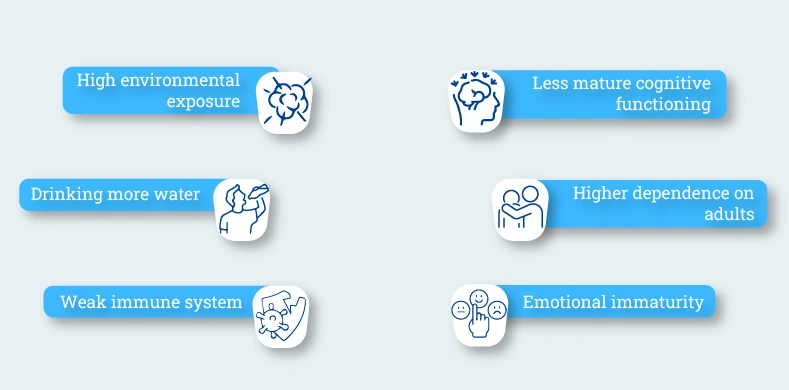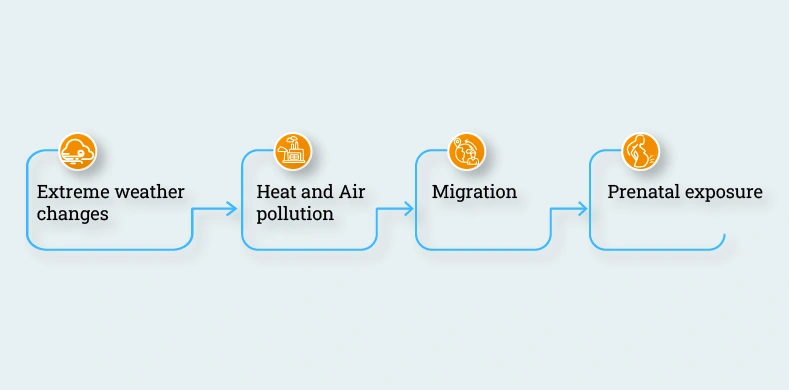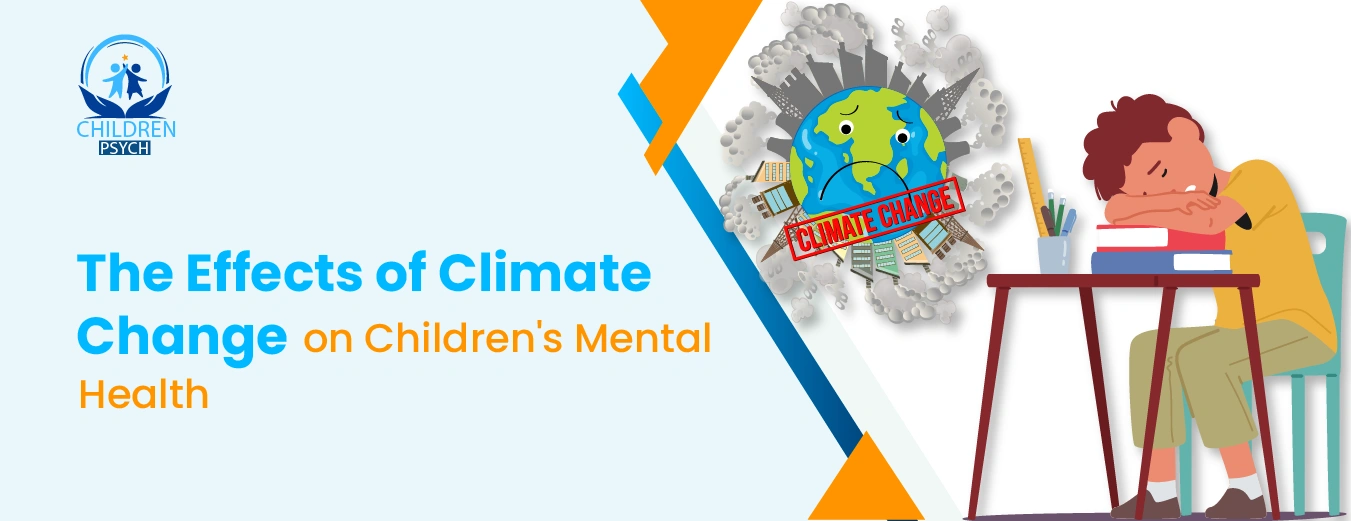Children are more susceptible to environmental stimuli such as climate change. Not only is their physical health affected, but their mental health also experiences certain negative changes as various common mental issues can occur, which include anxiety, depression, PTSD, etc. The developmental phase of their brain and their decreased adapting ability to a fluctuating environment make them more prone to becoming a victim of extreme climate changes. In addition, the mental health issues can persist into adulthood if not treated in time.
If you want to know more that what are the major effects of climate change on children’s mental heath then read this article. After reading this, you will also get an idea of what are the main mental issues that can occur in children due to climate change and how you can manage them.
Climate change & Children’s Mental Health
Children and adolescents whose age is below 18 are at that phase of their life where they show higher vulnerability to being affected by climate change as compared to adults. Climate change is not just a strong aspect of the environment, it also exerts major psychological effects. Individuals who experience any negative or severe weather event are more likely to suffer from climate-related stress as compared to others.
Numerous recent studies have estimated that every 1 in 3 children lives in regions where they are more exposed to approximately 4 environmental and climate shocks, which also overlap with each other. Major climate changes that can affect the children include:
- Heatwaves or cold waves
- Wildfires
- Dust, sand, or water storms
- Droughts
- Tropical cyclones
- Hailstorms and Blizzards
Furthermore, the child population that is more vulnerable to the climate-related fluctuations includes:
- Children of Color and Low-Income Families
- Indigenous communities
Factors that increase the Child’s mental health vulnerability to climate change
The main factors that increase the vulnerability of children towards the mental health impacts of climate change include:
1. Developing bodies
During the phase of childhood, children’s organs and internal systems are still in the developmental phase, and the process does not complete until they reach adulthood. Throughout this period, they are highly susceptible to suffering from climate-related issues such as bad air quality, heat waves, and toxic pollutants, which are spread in the air.
As the children’s breathing rate is usually faster so there are always high chances that they inhale the pollutants, which in turn affects their mental health. The toxic air pollutants can cause anxiety, depression, and some common behavioral issues.
Multiple studies have also reported cognitive impairments in children caused by air pollutants.
2. High environmental exposure
Children usually have more outdoor activities as compared to adults, so they are more exposed to climate change. Heat and cold stress, snow, rain, allergens in the air, insect bites affect them more and ultimately they have to suffer from many mental issues.
3. Drinking more water
As children are more involved in activities, they drink more water or fluid for their body weight as compared to adults. In this way, they make closer contact with the toxins or contaminants that are found in water. Moreover, various studies have also reported the fact that children swallow water two times more than adults during swimming. This is one of the main reasons why they have an increased risk of developing various gastrointestinal issues.
Moreover, water contaminants also directly affect the mental health of children. Increased exposure to lead, pesticides, and some other contaminants affects the brain growth and development of children. Ultimately, this can lead to common mental illnesses.

4. Weak immune system
The child’s immune system is the main defensive system that protects the body from any toxic or harmful agent. During development, children have weak or immature defense mechanisms that can not easily protect their physical and mental health from fluctuating temperatures and extreme weather or climate changes.
5. Less mature cognitive functioning
The cognitive functioning is also slower in children, which makes it difficult for them to understand and timely respond to any climate hazard or danger.
6. Higher dependence on adults
Children always depend on adults for living, and do not develop coping strategies to deal with the negative changes in climate or weather.
7. Emotional immaturity
Children and adolescents are also in their developing emotional phase before reaching adulthood. Therefore, they feel increased mental strain from fires, air storms, and heat and cold wave patterns. Due to their increased emotional sensitivity, they even feel stressed about moving to another place due to environmental or climate change threats.
Direct impact of Climate change on children’s mental health
1. Extreme weather changes
There is an increased possibility that those children who have experienced or witnessed any natural disaster, such as floods, wildfires, hurricanes, or tornadoes, may suffer from mental health disorders, including anxiety, depression, sleep issues, specific phobias, as well as post-traumatic stress disorder.
2. Heat and Air pollution
Higher rates of temperatures and the pollutants present in the air can directly impact the mental health of children. If the condition stays for a longer period, then it can also cause the development of mental health disorders.

3. Migration
In some cases, individuals living in areas that are more exposed to climate hazards have to migrate or change their living place. This also makes it more stressful for the children to accept it ,and they can suffer from mental issues.
4. Prenatal exposure
During pregnancy, if the mother is exposed to any environmental or climate-related stress elements, then the developing child can also experience major developmental and mental health issues.
Indirect impact of Climate change on Children’s mental health
1. Increased rate of stress
Children who are under the influence of climate change are under more stress than usual. News coverage regarding the climate fluctuations also overwhelmed them, and they started feeling fear for their future.
2. Family issues
Climate change leading to migration or displacement leads to financial issues. Therefore, each family member takes stress and faces the conflicts with each other due to their mental issues.
3. Academic issues
Climate change can also present academic challenges for children due to disrupted schooling. This affects their cognitive functioning and development, and ultimately on their academic rate of success.
4. Shortened lifespan
Climate hazards also develop a sense of hopelessness in children. As the long-term effects of climate change directly affect the brain development of children, there are more chances of the development of shortened future or lifespan due to the arising physical and mental issues.
5. Food insecurity
Climate change can also induce feelings of uncertainty or insecurity related to food. Families, including children, feel excessive fear of losing their food items or resources due to the negative impact of climate change.
What are the specific mental health conditions caused by climate change?
Any sudden, undesired, or negative changes in climate can cause the following conditions:
1. Anxiety
Anxiety is a common mental issue that affects children. Due to climate change events, children and adolescents can suffer from any type of anxiety disorder.
2. Depression
If the stress caused by climate change persists for a longer period, then it can also lead to the development of depression in children. Affected children feel a low mood and energy levels. In addition, they also experience major negative changes in the gastrointestinal tract.
3. PTSD
PTSD develops in these children who have experienced any traumatic situation, such as weather or climate changes. Due to their persistent stress, they experience the most common symptoms, which include nightmares, intrusive memories, and social isolation, etc.
4. Behavioral issues
Other than mental issues, children also exhibit major negative changes in their behavior, which include:
- Anger outburst
- Mood swings
- Focus or concentration issues
- Strong sense of isolation
What are the ways to protect the child’s mental health from climate change?
Children can easily cope with the negative climate fluctuations if they get support from their friends or loved ones. If parents, caregivers, or teachers take the necessary steps on time, they can protect their child from being affected by the negative changes in climate.
1. Educate the children
If the children are aware of each aspect of climate change, then they can make necessary actions on time. In addition, they can participate in different climate related programs as a volunteer with the goal of achieving optimal well-being.
2. Hydrate their body
If the temperature is high, then you should instruct your child to drink more water to prevent dehydration. In addition, ask them to find shadows and always apply sunscreen when they go out for any outdoor activity.
3. Keep the indoor clean
Make sure that your indoor place is also clean and free from pollutants. For this, you can use high-quality air filters to improve the quality of your indoor regions.
4. Use the insect repellents
As insect bites are common during environment fluctuations, therefore you can keep your children safe by the help of insect repellants to stay protected from the insect bites. Do not allow your children to directly use it and ask them to use it in the right way.
5. Safety plan
If you are living in any area that can suffer more from any sudden and severe climate changes then you must have a safety plan to deal with that emergency situation. So when you get any emergency signal, immediately move to that safe place with your loved ones.
6. Limit your child’s outdoor exposure
Keep an eye on the Air quality index to determine the quality of the air. If any day you feel that the air is polluted then limit your child’s outdoor activities. If they insist then ask them to come back early and also avoid playing in crowded and high traffic zones of their area.
Talk to an expert
If you feel that you are unable to help your child anymore from the negative impact of climate change, then you can seek professional help from Child’s mental health experts. Mental health services, including therapy and medications, can help children with their emotional and psychological stress caused by climate change.
Other best ways that can help in managing the mental issues caused by climate change include:
- Engaging in mindfulness activities
- Expressing emotions
Get professional Mental support for your child at Children’s Psych.
Children Psych is a premier platform where you can find the best psychiatric services for children and adolescents. At Children Psych, we have a team of skilled, professional, and board-certified child psychiatric nurse practitioners who provide personalized solutions for children or adolescents who are suffering from common mental health issues such as anxiety, depression, OCD, bipolar disorder, and ADHD.
So if your child is battling with any mental issue, then we are here to help you. Our experts have years of experience in treating the common psychiatric issues of children. Depending on the mental state of your child, they develop a treatment plan that comprises medications and therapy. They first identify the triggers and then develop a tailored treatment plan that will surely work for your child.
So what are you waiting for? Book an appointment with our experts and help your child live a healthy life with a balanced state.
Frequently Asked Questions
Can climate change affect children’s mental health?
Yes, climate change can directly impact the mental state of children. The more occurence of natural disasters, the more chances of children suffering from anxiety, depression, and PTSD.
What are the major effects of climate change on kids?
Major negative impacts of climate change on kids include physical abnormalities such as difficulty in breathing, issues of nutrition, and common mental issues.
Which mental issues can get worse due to climate change?
Climate fluctuations can develop mental issues in children, which include anxiety, depression, post-traumatic stress disorder, and behavioral issues.




